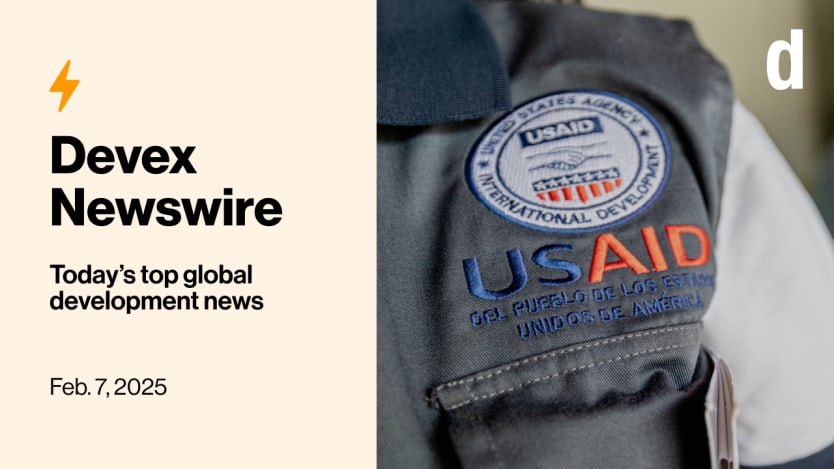
Word’s in and it’s worse than we thought — USAID staff is being reduced from more than 10,000 to around 290. That’s not just being gutted; it’s being eviscerated, disemboweled. Those numbers include thousands of employees — and their families — forced to leave their overseas posts. But the legal fight against the agency’s demise has finally begun in earnest.
Also in today’s edition: Rubio says the U.S. is not abandoning aid, yet food is stuck at ports.
This is a preview of Newswire
Sign up to this newsletter for an inside look at the biggest stories in global development, in your inbox daily.
Happening today: See you soon at 10 a.m. ET (4 p.m. CET) for a webinar on the career emergency caused by the USAID job cuts. To help navigate this challenging time, Devex is hosting this FREE event offering expert guidance on what to do if you’ve lost your USAID job. Register now and submit your questions in advance.
Who’s even left?
Can we officially declare it? Is USAID gone? Judging by staff numbers, it’s toast. In a startling revelation, we learned that the number of agency staff will plunge by over 95%, according to three sources and Atul Gawande, former USAID global health chief.
On the social media platform X, Gawande wrote, “Rubio claims that @USAID lifesaving assistance for health and humanitarian needs will continue,” referencing U.S. Secretary of State and now acting USAID Administrator Marco Rubio. “But his team just communicated that the entire agency will be imminently reduced from 14,000 to 294 people.”
The purge leaves just 78 people in the Bureau for Humanitarian Assistance, 77 in the Bureau for Global Health, and smaller numbers in various regional offices — with only 21 focusing on the Middle East and 12 covering Africa. Let’s repeat that: 12 people will cover the whole of Africa.
Adding to the upheaval, the Bureau of Resilience, Environment and Food Security and the Bureau of Inclusive Growth, Partnerships and Innovation will be completely eliminated, a USAID staffer tells my colleague Elissa Miolene.
Gawande likely summed up the mood among USAID employees when he tweeted: “One long time foreign service officer told me: ‘Our government is attacking us. This is worse than any dictatorship where I’ve worked.’”
Read: USAID’s workforce to be slashed to just 294 staff
Careers, lives upended
Emily, a career foreign service officer, and her partner, grappling with a high-risk pregnancy and recent emergency room visits, now face an added crisis due to U.S. President Donald Trump’s recall of almost all USAID direct hires stationed abroad. The decision places Emily on administrative leave from today, ending her overseas assignment while managing health complications and the logistics of a new child.
“God forbid this leads to the loss of a pregnancy,” Emily says.
This turmoil impacts not just her family but also thousands of USAID workers worldwide, now caught in confusion and chaos with scant guidance from the administration, writes Devex Senior Reporter Sara Jerving.
USAID, previously home to over 10,000 staff worldwide and a $40 billion annual budget for initiatives from disease control to emergency food aid, is disintegrating. Lifesaving projects are being shut down, reimbursements are stalled, and operations are paralyzed, leaving vulnerable communities even more vulnerable, endangering local staff who collaborated with U.S. democratic efforts, and turning the lives of public servants like Emily upside down.
In the past day, USAID’s website has been updated to state that agency personnel can choose to stay in their host countries while on administrative leave but agency-funded return travel to the U.S. “may not be available” after 30 days.
Read: Left in the dark — the human toll of USAID’s global recall of employees
+ We’re gathering insights from across the sector to understand what this unprecedented USAID shutdown and 90-day freeze means on the ground. How are organizations adapting? What's happening to local partnerships? Where does development go from here? Take 15 minutes to share your confidential perspective and help us document this critical inflection point. Answer our survey here.
Fighting back
Trump’s USAID onslaught blindsided many employees. But now, they’re fighting back.
A lawsuit filed late yesterday on behalf of the unions representing USAID employees argues that the Trump administration’s efforts to shutter the agency are unconstitutional.
The lawsuit — filed against Trump, the U.S. State Department, USAID, the U.S. Treasury Department, Rubio, and Treasury Secretary Scott Bessent — seeks an injunction to stop the administration’s actions, which include halting U.S. foreign aid and firing or placing on leave most of USAID’s workforce — especially before almost all direct hire staff are placed on leave at 11:59 p.m. ET today.
“We want to halt that, and we want to reverse some of the harms that have already befallen so many American workers who work for USAID and as well as the people that they serve around the world,” Lauren Bateman, an attorney at Public Citizen Litigation Group and one of the lawyers representing the unions in this case, said on a call with reporters yesterday.
“Without judicial intervention it will only get worse,” the lawsuit argues.
Read: Lawsuit seeks to halt dismantling of USAID
+ Listen: For the latest episode of our podcast series, Devex’s Adva Saldinger, Sara Jerving, and Elissa Miolene break down how the Trump administration dismantled USAID.
Adapting amid uncertainty
In the wake of Trump's 90-day aid freeze, U.N. humanitarian efforts have gone into high gear to adapt and endure. The U.N. Office for the Coordination of Humanitarian Affairs, aka OCHA, now led by Tom Fletcher, and the World Food Programme, with Cindy McCain at the helm, are tightening their belts with a series of cost-cutting measures.
Both agencies are halting recruitment, minimizing travel, and suspending nonessential procurement.
OCHA is strategically reprioritizing its budget to focus on urgent needs, while preserving its Operation Cash Reserve for unforeseen emergencies, writes our Vince Chadwick. Fletcher tried to reassure his team in an all-staff email, emphasizing the organization's resilience and capacity to adapt and deliver under pressure.
Similarly, WFP, which has historically enjoyed bipartisan support in the U.S., is extending its recruitment pause globally and limiting staff trips to essential travel only, our Colum Lynch writes.
Read: UN humanitarian arm to scale back work amid US funding crisis
Scoop: Even Washington’s favorite UN agency has to tighten its belt
Quick, critical alignments
Amid the whirlwind dismantling of USAID, Rubio urged patience and trust from staff as he navigates the agency’s alignment with Trump’s “America First” agenda. “The United States is not walking away from foreign aid,” Rubio assured during a closed-door meeting, emphasizing the need for defensible and explicable programs.
During the 90-day foreign aid freeze, Rubio's strategy involves quick-turnaround reviews to decide which USAID programs make the cut. He candidly acknowledged at the meeting that foreign aid isn't exactly a crowd-pleaser back home, noting, “I spent a lot of time in my career defending it and explaining it, but it's harder and harder to do.”
This directive came to light after an all-night effort by U.S. Ambassador to Guatemala Tobin Bradley and his team to draft a document showcasing how their missions could support the “America First” framework. Inspired by their diligence, Rubio has called for a similar scrutiny across all missions globally — a task complicated by staff being locked out of their systems, with many facing administrative leave by week's end.
“I know it’s hard to ask for patience. I know it’s hard to ask for trust, because you’ve never met me before,” Rubio said, acknowledging the challenges ahead as he steps into these roles for the first time. His closing remark at the meeting — “we’re just going to have to do it a little faster than we thought” — captures the urgency and scale of the task at hand.
Read: Rubio asks for ‘trust’ from USAID mission while agency is gutted
Join us on Monday, Feb. 10, for a Devex Pro briefing with Jim Richardson, who was director of the State Department’s Office of Foreign Assistance in the first Trump administration. He will share his perspectives on the aid freeze, USAID reorganization, and what the future of U.S. foreign assistance might look like. Save your spot now.
This event is part of a series to navigate the uncertainties of the aid freeze, exclusively for Devex Pro members. Not yet gone Pro? Start your 15-day free trial now to access the event and all our exclusive offerings!
Spoiled rotten
Caught in bureaucratic limbo due to the Trump administration's foreign aid freeze, a staggering 500,000 metric tons of U.S.-grown food commodities, valued at nearly $500 million, are stuck in ports and warehouses. This stash — enough to feed over 36 million people — faces the risk of spoilage, impacting staples such as corn, rice, and soybeans earmarked for nations including Afghanistan and Yemen.
While a waiver for emergency food assistance exists, it’s shrouded in confusion over what exactly qualifies, leading to a holdup that could potentially push millions toward famine, write my colleagues Tania Karas and Ayenat Mersie. This food jam not only threatens global hunger relief but also U.S. agricultural interests, as American farmers lose out on crucial markets for their crops.
Amid this chaos, vital U.S. interests hang in the balance, including the health of U.S. diplomacy and agricultural economics. As the clock ticks down, the urgency to resolve this deadlock and get the aid flowing again becomes ever more critical, underscored by pleas from political and agricultural leaders alike. This logistical nightmare highlights a broader issue: The intricate dance between U.S. aid, global diplomacy, and domestic agricultural economics is now all paused midstep.
Read: US-grown food aid is stranded in ports worldwide despite waiver
+ For more content like this, sign up to Devex Dish, our weekly newsletter on the transformation of the global food system.
In other news
U.S. Secretary of State Marco Rubio will be a no-show at the G20 summit in Johannesburg, South Africa. [Reuters]
A contingent of 200 Kenyan police officers arrived Thursday in Haiti to help quell gang violence in the Caribbean country. [AP]
A U.N. humanitarian official has warned of the escalating violence in Sudan, as 80 people died and many were injured in the latest clash. [UN News]
Sign up to Newswire for an inside look at the biggest stories in global development.








